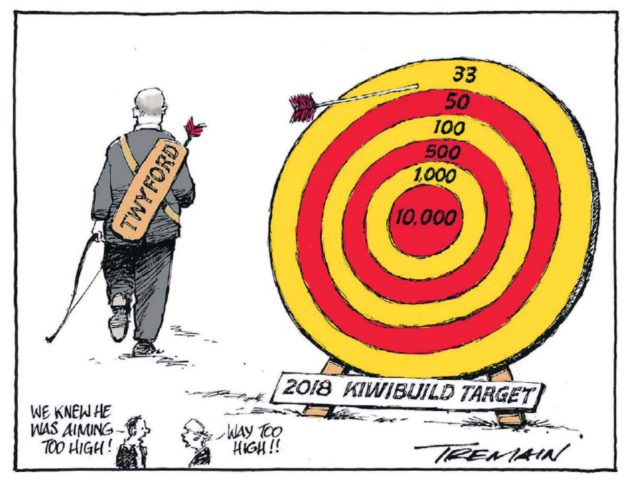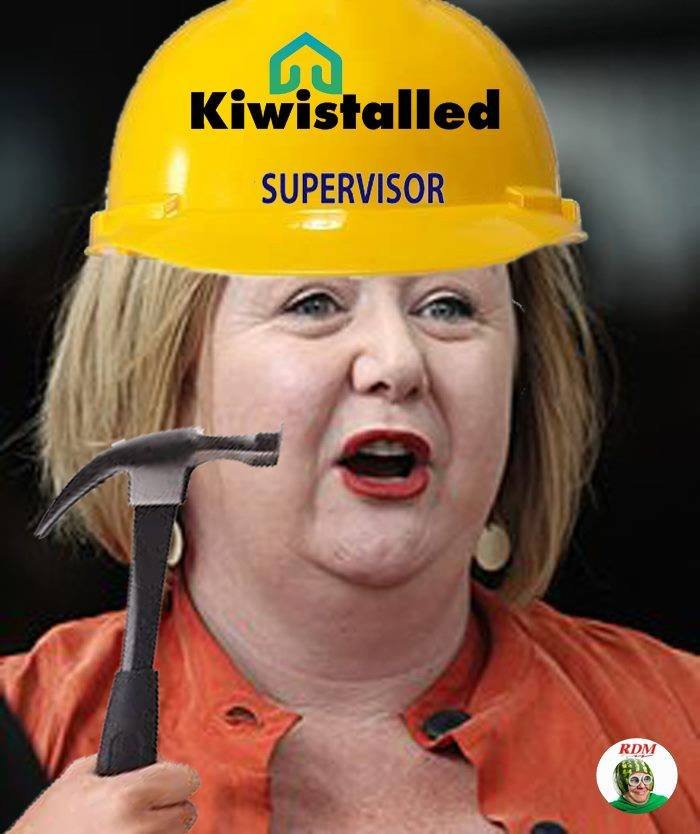The original idea was floated by David Shearer in 2014. It was named Kiwibuild. The Labour Party imagined itself as the champion of young families; providing them all with homes, as they had done in the 1960s. This time, though, it would be even better, as these houses would be owner occupied. What a daring scheme! What heroes they would all be.
In 2014, they campaigned hard on Kiwibuild. Phil Twyford, foreshadowing the cry of ‘Nine Years of Neglect’, promised he would solve the problems for all those young families ‘locked out’ of the housing market. The champions of the downtrodden: Twyford, and his Labour mates, would provide affordable houses for the masses. Everyone who had ever dreamed of owning their own home would have that dream fulfilled.

In what we now know to be typical histrionics with no research, Labour took their plan into government, obviously thinking it was all going to be easy. Not once had they stopped to wonder why houses had become so expensive in the first place. They had not considered the questions of building regulations, resource consents, land zoning, building costs, supply of land, the availability of construction workers… which is where they should have started. They should have begun with overhauling the various acts and regulations that slow down the building process so drastically. But no. They thought they would be able to knock up 10,000 houses a year with no real effort. Produce a report, perhaps a working group or two and all would be well.
The KiwiBuild “reset” won’t satisfy New Zealanders desperate to see housing made affordable. The changes announced today are an attempt to lower the public’s expectations, and voters should insist on something better.
Many voters will be feeling “ripped off” after today’s KiwiBuild reset.
It turns out it was more about resetting public expectations than getting the government’s housing affordability project “back on track” and actually delivering.
The problem is, fixing the housing affordability was one of the promises that got this Labour-led government elected.
They weren’t elected, but that is hardly the point. They arrived in government and continued to promise affordable houses for the masses… a promise that they had no idea they were never going to be able to deliver.
Labour, in particular, won votes on their specific promise to build 100,000 affordable homes.
It’s now officially a broken promise.
Housing Minister Megan Woods announced today that the promised 100,000 house figure will be scrapped, and no new target will replace it.
It’s the kind of cynical “solution” that leads voters to lose faith in politics and have a low opinion of politicians.
In abandoning the promise of 100,000 affordable houses, it seems the minister wants us to believe that it was the existence of this target that was the problem, not the government’s failure to deliver. So, she has gone with the option of cancelling the target rather than redoubling efforts to meet it.
I think people would have forgiven the government if, instead of building 10,000 houses a year, they built 8,000. The fact that they have built about 200 in 2 years shows that they never had a hope in hell of meeting people’s expectations… expectations that were created by this overreaching government in the first place.
Woods now says that the government will simply deliver “more houses” as part of their programme. But voters shouldn’t allow such a lack of accountability and should insist that the electoral contract be fulfilled. The media, too, should continue to tally the number of houses against the promise of 100,000.
Dead right. Sometimes politicians need to be held to account. With a bold promise like this, the voters have the right to expect more than a backdown, and a promise that they will still build houses, but no one has the foggiest idea how many.
A target has been put forward in terms of the “progressive homeownership” initiative: as part of the KiwiBuild reset, 4000 households could be brought into homeownership through a shared equity or rent-to-buy scheme.
“Could be’… but we are a bit short of the 100,000 houses promised, and none of these are necessarily Kiwibuild houses. Also, 4000 is a drop in the ocean, being somewhat less than 100,000.
Unless 100,000 affordable houses are no longer needed for some reason, the government should have risen to the occasion and found a way to embark on a full-scale housing infrastructure project that actually meets society’s needs.
That would have cost more money. But at the moment there’s a developing consensus amongst economists about the need for this government to start spending much more on all sorts of social goods – housing, education, transport, health – in order to fix problems and stimulate the economy.
Everyone seems to have forgotten that these Kiwibuild houses were going to be at no cost to the taxpayer; that the government might have to put some money up front, but that would be refunded and then recycled once the houses were sold. Now we are talking about millions of taxpayers dollars going into a bottomless pit to provide affordable housing for the chosen few. But why should the taxpayer fund people into private homes? That is a rhetorical question because, of course, they shouldn’t. No way.
Labour possibly thinks it’s being smart in being so conservative on housing and in scaling back its ambitions. But there’s a strategic danger for them in their caution. For many government supporters, today’s “reset” will be seen as an embarrassing capitulation.
Which is exactly what it is.
The truth is that the government soon came to realise that they were never going to be able to come anywhere near fulfilling the promises they had made on Kiwibuild, but because they had made so much noise about it, they were forced to front up to their failure. Voters don’t really care about the details of why their promises went so spectacularly wrong. All they know is that they thought there would be affordable houses available and there are none.
Having won power in 2017 on the basis of promises like KiwiBuild, it would be apt if the Labour-led government lost that power in 2020 because of their failure to deliver.
Stuff
Wow. This is academic writer Bryce Edwards speaking. In general, he is a government supporter, although not a sycophant like many of them. If the government has lost people like Bryce Edwards, they really are in trouble.

